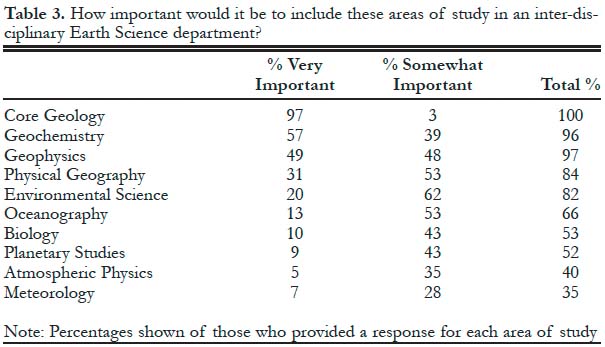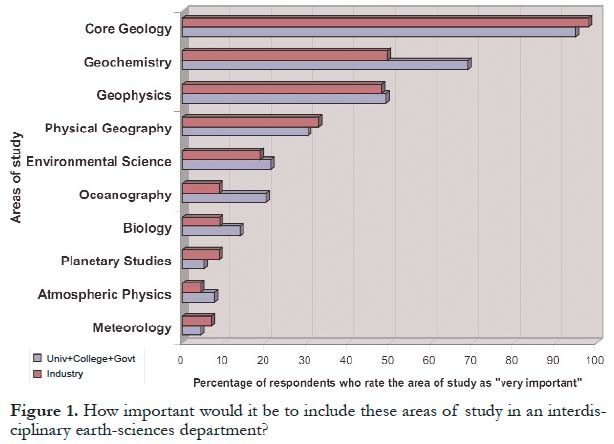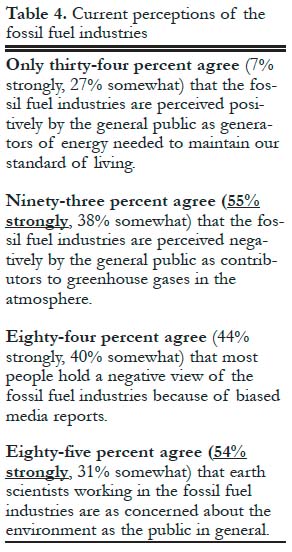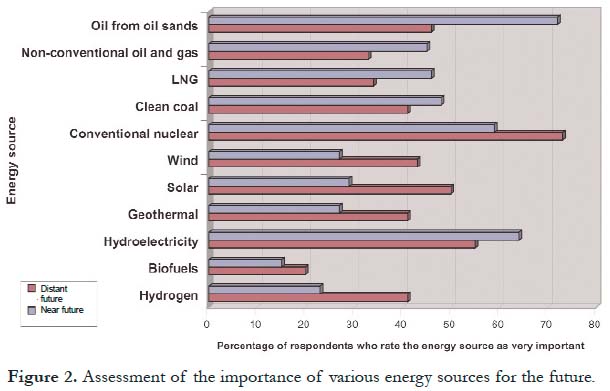Articles
Canada-wide Survey of Canadian Scientiests:
A Preliminary Report on the State of the Discipline, the Fossil Fuel Industries and Environmental Science
Charlene E. MiallDepartment of Sociology McMaster University Hamilton, ON, Canada, L8S 4M4
miallce@mcmaster.ca
Andrew D. Miall
Department of Geology University of Toronto Toronto, ON, Canada, M5S 3B1
miall@geology.utoronto.ca
SUMMARY
A survey of Canadian earth scientists has yielded important information concerning their attitudes in four key areas relevant to the future of geoscience in Canada. First, most respondents agree that traditional geology departments in Canada are shifting their primary focus from the science of exploration and extraction of resources to environmental science and environmental remediation. Second, a majority believe that fossil fuel industries are perceived by the general public as contributors to global warming. Notably, most respondents also support the implementation of programs to mitigate the effects of these emissions. Third, in terms of the relevance of earth science to the study of climate change, although a majority responded that climate change, over the last few decades, has been driven by a combination of natural and anthropogenic processes, most also agreed that explanations for this climate change have not adequately taken paleoclimate data into consideration. Finally, in terms of the role of science and advocacy in informing public policy, a significant majority of respondents felt that public understandings and media representations of climate change are not based on good scientific knowledge and that politicians are more influenced by public opinion than science. Most respondents felt that earth scientists need to become more active in speaking out about social problems and their solutions. An agenda for change should include the development of public position statements on issues of national importance, and a public education campaign about the work of the geoscience community.SOMMAIRE
Une enquête d'opinion menée auprès des géoscientifiques canadiens a mis au jour des informations significatives sur leurs attitudes quant à l'avenir des géosciences au Canada. Premièrement, la plupart des répondants se sont dit d'avis que les centres d'intérêts des départements de géologie au Canada changeaient des sciences de l'exploration et de l'extraction des ressources vers les sciences de l'environnement et les sciences de restauration de l'environnement. Deuxièmement, une majorité ont dit croire que les industries des énergies fossiles sont perçues par le public en général, comme facteurs du réchauffement planétaire. On notera aussi, que la plupart ont dit soutenir la mise en œuvre de programmes d'atténuation des effets des émissions dont elles sont responsables. Troisièmement, quant à l'intérêt des géosciences dans l'étude des changements climatiques, bien qu'une majorité se soit montrés d'accord, que les changements climatiques des dernières décennies aient été causés par une combinaison de processus naturels et anthropogéniques, la plupart ont considérés que les explications n'avaient pas suffisamment tenu compte des données paléoclimatiques. Finalement, en ce qui à trait à la science et à son devoir d'information et de soutien des politiques publiques, une importante majorité des répondants ont estimé qu'en matière de changements climatiques, la compréhension du public et la représentation qu'en donne les médias ne reposent pas sur des connaissances scientifiques de qualité, et que les politiciens sont davantage influencés par l'opinion publique que par la science. La plupart des répondants ont estimé que les géoscientifiques devaient s'investir davantage dans les débats et faire entendre leur voix sur les problèmes sociaux et leurs solutions. Toute initiative de changement doit comprendre un volet d'élaboration de prise de position publique sur les questions d'intérêt nationale, ainsi qu'une campagne d'éducation du public sur le travail de la communauté géoscientifique.INTRODUCTION
1 In the last thirty years, the earth sciences, and geology in particular as a discipline and a profession, have been challenged by the emergence of issues such as resource depletion and the linking of environmental degradation to the burning of fossil fuels. Following the petroleum crises of the mid- to late 1980s, for example, employment in Canadian resource industries became less predictable. As a consequence, enrolment in many undergraduate geology programs across Canada dropped dramatically. In response, university administrators began to amalgamate geology departments with other disciplines within renamed "Earth Science" or "Geoscience" departments, many of them including disciplinary specializations such as oceanography and atmospheric physics. Partly as an attempt to answer emerging scientific questions, and partly as an attempt to increase enrolments, environmental geoscience courses were included in the new programs.
2 Furthermore, current university hiring and research funding decisions suggest that environmental geology, as a specialization, may be assuming more importance than a traditional resource-based approach that trains geologists for mining and extraction industries. For example, a report to NSERC by the Solid and Environmental Sciences Steering Committee recommended increasing funding resources for environmental topics (Natural Sciences and Engineering Research Council of Canada 2000). This shift in emphasis has led to some concerns regarding the training of the future workforce for the resource industries, and the ability of professional certification bodies to keep pace with the scientific curriculum changes currently underway.
3 Concurrently, the degradation of the environment has emerged as a major global concern. Attention has focused on the role of anthropogenic or human factors, such as the burning of fossil fuels, and on global environmental problems such as ozone depletion, toxic emissions, and global warming. In their studies of corporations and their allies, McCright and Dunlap (2000) and Beder (2002) have characterized the response of the fossil-fuel industry to environmental problems that involve human factors, and to environmental protectionism legislation like the Kyoto Accord, as monolithic and uniformly negative. However, this "monolithic" model of the fossil-fuel industry as it relates to global warming and environmental legislation masks the debate currently underway.
4 For example, Skodvin and Skjærseth (2001) have documented how Royal Dutch Shell and Shell US, based in Houston, differed in their support for the ratification of the Kyoto accord. There has also been controversy within the geological community concerning the role or non-role of human factors in global warming. For example, the earth science profession includes geoscientists who work in the fossil-fuel industries, which are identified as a major source of greenhouse gases, and geoscientists who work in environmental geoscience and focus on the role of greenhouse gases in climate change.
5 In this article, we report on a Canada-wide survey designed to assess earth scientists’ perspectives on their discipline, the future of the fossil fuel industries, and environmental problems linked to climate change science and global warming. Funded by the Social Sciences and Humanities Research Council of Canada (SSHRCC), approved by the McMaster University Research Ethics Board, and assisted by the Canadian Society of Petroleum Geologists (CSPG) and the Geological Association of Canada (GAC), the survey represents a "snapshot in time" of the opinions and concerns of Canadian earth scientists. It is intended to help identify future directions for earth science and for the resource industries, based on the perspectives of earth scientists themselves.
A WORD ABOUT THE METHOD, THE SAMPLE AND THE DATA
6 This research was carried out in two phases. In the first phase, we conducted exploratory interviews with earth scientists to elicit their views about the issues being studied. We located, recruited and interviewed 71 geologists in 15 Canadian cities from Victoria to St. John’s. Most of these individuals are considered by their peers as opinion leaders in scientific research, in industry, and/or as contributors to social policy debates about earth science issues in Canada. The sample included Canadian geologists working in universities, the fossil-fuel industries, government institutions, and professional organizations. The interviews lasted from one to four hours, were openended, and had no pre-set questions. All interviews but one were taped and transcribed to ensure accuracy in documenting perspectives. Themes emerging from these interviews were used in the second phase of the research to construct a web-based questionnaire.
7 The web-based questionnaire had five sections, with questions that elicited information on demographics such as education and employment, and earth scientists’ perspectives on their academic discipline, the resource industries, climate-change science, and the role of science and advocacy in social problems. The survey, established on a secure server at McMaster University, was accessible only to members of the CSPG and GAC and was on-line for completion from April to October, 2007. A total of 355 members completed the survey.
8 The demographics of this sample are provided in Table 1. Most respondents were male, middle-aged, well-educated, and had incomes over $100 000 a year. Notably, the largest proportion of respondents [43%] was employed in industry, with an additional 14% self-employed in industry. Residence and gender distribution of GAC respondents closely reflected those of the national membership (GAC headquarters, pers. comm. 2008); Canadian Society of Petroleum Geologists respondents predominantly resided in Alberta.
9 Although the response rate reported here was only 7% of potential CSPG/GAC membership, it represents the largest sample of earth scientists to be polled on these issues in North America to date. In comparison, only 93 of 31000 members of the American Association of Petroleum Geologists (AAPG) answered a request to comment on the society’s climatechange statement – less than 0.3% (President’s Column, AAPG Explorer, September 2007), and only 2% of members of the Association of Professional Engineers, Geologists and Geophysicists of Alberta (APEGGA) responded to their survey on climate change (PEGG, March 2008). Although we don’t claim to represent the views of all CSPG/GAC members, this report offers insights into the views of those who might be considered most concerned about the issues put forward in the survey, a point we return to later in the article.
Table 1. Demographic characteristics of survey sample (n=355).
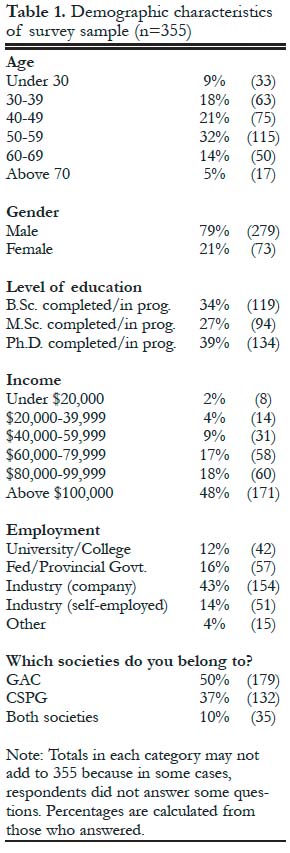
Display large image of Table 1
10 In the following sections, we discuss the majority direction of agreement or disagreement with the various statements that make up the survey. We also provide a breakdown of those strongly or somewhat agreeing or disagreeing so that response strength can be considered. As these are preliminary results, they should be interpreted with caution. More detailed data analysis of these and other issues not discussed in this report will be forthcoming in academic papers in preparation.
CURRENT STATE OF THE DISCIPLLINE AND RESOURCE INDUSTRY NEEDS
11 A decline in enrolments in geology departments in the late 1980s led to the closure or merger of some departments across North America (cf. Canadian Enrolment Report at [http://cccesd.acadiau.ca]). For example, in Canada, geology departments at McMaster University and the University of Alberta were merged with geography departments and have developed strong components in environmental teaching and research. Geology departments at Concordia University and Université de Montréal have actually been closed.
12 In this survey, there was general agreement [93%] that Canadian Earth Science departments have shifted to an interdisciplinary focus, with a lessening focus on the geology of resource exploration and exploitation [82%] (Table 2). There was also general agreement [73%] that there is a gap between the job requirements of the oil and gas industry, and the training provided in earth science degree programs. In our interviews, many university chairs of departments noted that the need to meet professional registration qualifications required them to continue to offer courses in resourcebased geology despite changes to programs and curricula brought on by mergers or a refocusing on environmental geoscience. Indeed, our interview data suggest that conflicting curricula create pressures within university departments to accommodate increasingly diverse needs in teaching while adjusting, in many cases, to smaller faculty complements. Not surprisingly, therefore, 71% of respondents agreed that Centres of Excellence with degree programs that specifically prepare undergraduates to work in the fossil fuel and mining industries should be established, and 32% strongly agreed.
ASSESSMENT OF INTERDISCIPLINARY PROGRANS AND AREAS OF STUDY
13 Given the perception of a general shift to interdisciplinary studies, respondents were asked to evaluate the importance of various specializations in an interdisciplinary earth science department (Table 3). There was clear agreement that core geology [97%], geochemistry [57%] and geophysics [49%] are very important. However, although most respondents felt physical geography [84%] and environmental science [82%] were important to some extent, only 31% and 20% respectively felt they were very important. Although the importance of biogenic activity in geological processes is increasingly recognized, only 10% felt biology was very important and 47% of our respondents considered it not very important or not important at all. Planetary studies were rated as important to some extent [52%], but only 9% rated them as very important.
Table 2. Current state of the discipline and resource industry needs.
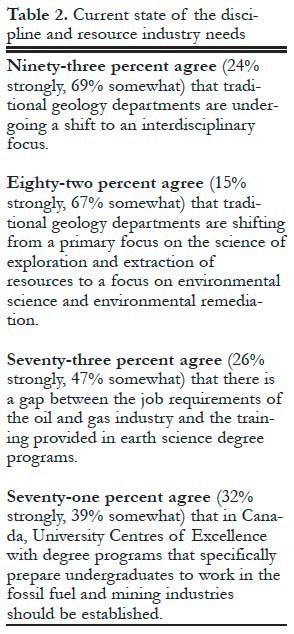
Display large image of Table 2
14 Oceanography, atmospheric physics and meteorology, all of which have been extremely important components of environmental studies of climate change, were considered important to some extent by 66%, 40% and 35% of our respondents, respectively. However, only 13% felt oceanography was very important to an interdisciplinary earth sciences program; and 60% and 65%, respectively, rated atmospheric physics and meteorology as not very important or not important at all in an earth sciences department. This would suggest a lag between changes in the structure of university earth science departments, identified in our interviews, and the disciplinary identification of relevant academic subjects by academic and professional geologists alike. For example, when the views of earth scientists in academic/government institutions are compared with those employed in industry (Fig. 1), the results are almost the same, with the exception of geochemistry and oceanography. These rankings may also have relevance for the importance of earth sciences in the debate on global climate change, an issue we discuss later in the paper.
Table 3. How important would it be to include these areas of study in an inter-disciplinary Earth Science department?
Figure 1. How important would it be to include these areas of study in an inter-disciplinary Earth Science department?CURRENT PERCEPTIONS OF THE FOSSIL FUEL INDUSTRIES
15 In Canada, until recently, the fossil-fuel industries were perceived positively by the general public as generators of energy needed to maintain our standard of living. However, as noted in Table 4, only 34% of our respondents agreed that this perception still holds, whereas 66% disagreed. Furthermore, 93% of respondents agreed, to some extent, that the fossil-fuel industries are perceived negatively today by the general public as a major source of greenhouse gases in the atmosphere, and 55% strongly agreed with this statement. A further 84% agreed [44% strongly agreed] that these negative perceptions of the fossil-fuel industries could be tied to biased media reporting. Notably, 85% of respondents agreed, to some extent, that earth scientists working in the fossil fuel industries are as concerned about the environment as the public in general, and 54% strongly agreed. As one of our interview respondents working in industry noted: "We are all citizens and we all need to be environmentalists."
Table 4. Current perceptions of the fossil fuel industries.
RESOURCE EXTRACTION AND ENVIRONMENTAL REMEDIATION
16 Support for environmental remediation was generally strong (Table 5), as 91% of respondents agreed, to some extent, that environmental remediation should be a priority within the fossil fuel industries, and 57% strongly agreed with this statement. Furthermore, 80% of respondents agreed, to some extent, that carbon sequestration should also be a priority. However, only 37% of survey participants felt that the fossil fuel industries could be trusted to comply with voluntary carbon emission standards, and 63% disagreed with this statement. In terms of employment, 71% of respondents working in academic/government institutions and 56% of geologists working in industry disagreed that fossil fuel industries could be trusted to comply voluntarily.
Table 5. Resource extraction and environmental remediation.
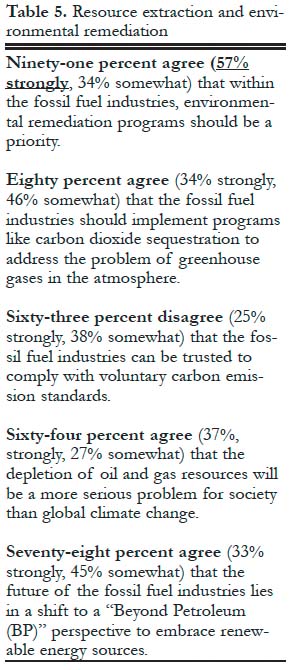
Display large image of Table 5
17 The notion of a monolithic, negative industry response to environmental initiatives does not appear to be entirely accurate. The majority of our respondents, whether in universities, government or industry supported environmental remediation and considered earth scientists working in the fossil-fuel industries to be as environmentally concerned as the general public. As noted earlier, Royal Dutch Shell supported the ratification of the Kyoto Protocol, whereas Shell US did not (Skodvin and Skjærseth 2001). Onethird of our respondents (out of 78% agreeing to some extent) strongly supported the notion that the future of the fossil fuel industries lies in a shift to a "Beyond Petroleum (BP)" perspective that would embrace alternate and/or renewable energy sources. Most of our interview respondents also strongly supported the shift in emphasis, although there was some skepticism about whether the shift in BP has been more public relations than real change. Nevertheless, fossil-fuel industries appear to be moving away from a focus on petroleum towards what might be described as the "energy industry."
Figure 2. Assessment of the importnace of various energy sources for the future.ASSESSMENTS OF ENERGY SOURCES IN THE NEAR AND DISTANT FUTURE
18 To explore these perceptions further, respondents were asked to rate the importance of energy sources in the near future and in the distant future (Fig. 2). As can be seen, a majority of respondents rated the oil sands, conventional nuclear energy and hydroelectricity as very important energy sources in the near future. However, for the distant future, most of the respondents considered only nuclear energy and hydroelectricity as very important and support fell for the oil sands as an energy source. Respondents also indicated that non-conventional oil and gas, liquefied natural gas (LNG) and clean coal will decrease in importance in the more distant future. Renewable energy sources such as wind, solar, geothermal, biofuels and hydrogen were rated as very important in the near future by less than 30% of the survey respondents. Although respondents suggest an increasing importance for these energy sources in the more distant future, only solar energy reached near majority support as very important. These assessments may reflect the expertise of earth scientists, who are more familiar than the general population with the scale of energy requirements in modern society and the degree to which these can be met by currently popular alternative energy sources.
EARTH SCIENTISTS' PERSPECTIVES ON CLIMATE CHANGE SCIENCE
Current state of global climate
19 In Table 6, we present survey responses to questions on the current state of climate change science and global climate in general. Notably, 95% of survey respondents agreed that the global climate is growing warmer with 51% strongly agreeing. Further, 82% agreed, to some extent, that both natural and anthropogenic causes are at work, with 54% strongly agreeing. In terms of employment, earth scientists working in academic/government institutions were significantly more likely to strongly agree with these statements than earth scientists working in industry, although, as noted, there was overall general agreement on these issues.
20 Although the majority [57%] strongly or somewhat agreed that climate change within the last few decades has been driven primarily by anthropogenic influences, there was much less support for this than for the concept of global warming in general, as only 17% agreed strongly. On this issue, earth scientists working in academic/government institutions were significantly more likely to agree than earth scientists working in industry. The level and intensity of agreement with the model of anthropogenic climate change [57%] might seem surprising, however, as it does not appear to reflect the intense debate about causes of climate change that has taken place in various forums, such as AAPG panels and letters to AAPG Explorer.
Table 6. Earth scientists' perspectives on climate change: Current state of global climate.
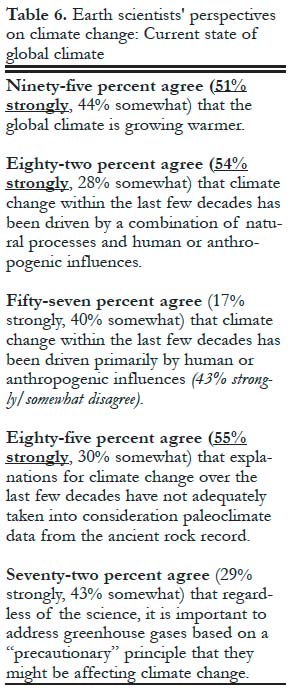
Display large image of Table 6
21 There is majority agreement [85%, with 55% strongly agreeing] that geological data, specifically paleoclimate data, have not been adequately taken into account in explanations of recent climate change. On this issue, earth scientists working in industry were significantly more likely to strongly agree than earth scientists working in academic/government institutions. It should be noted that these concerns about paleoclimatology have now been addressed, to some extent, by the Intergovernmental Panel on Climate Change (IPCC, 2007). While earlier assessments did not specifically address this science, the Fourth Assessment of Working Group 1 (IPCC, 2007), contains a lengthy and detailed chapter on paleoclimatology, focusing primarily on the climate of the postglacial period.
Assessments of influences on climate change
22 Survey respondents were also asked to rate the importance of a number of processes as influences on climate change over geologic time (Fig. 3), and over the last few decades (Fig. 4). The "conditioning" of earth by changes in solar radiation, changing tectonic plate configurations, and the effects of volcanic activity (emissions of greenhouse gases and particulates) are clearly regarded as the most important influences on climate change over the geologic time scale (Fig. 3). Although orbital forcing (Milankovitch cycles) was regarded as an important influence by those expressing an opinion, 25% of the survey respondents had no opinion, suggesting either ambivalence or a lack of familiarity with this process. Similarly, 47% had no opinion about cosmic ray flux affecting cloud formation, so support for this process should be interpreted with caution.
Figure 3. How importnat do you think the following processes have been as influences on climate change over Geologic time?
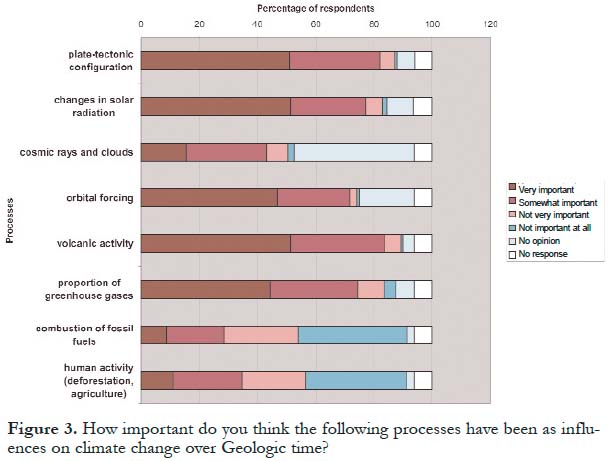
Display large image of Figure 3
23 Turning to the more immediate past (Fig. 4), the period during which anthropogenic influences might be regarded as having had more influence, there is a fairly significant shift to the opinion that an increase in greenhouse gases such as carbon dioxide and methane from combustion of fossil fuels, and other forms of human activity such as deforestation and agricultural practices, have been very important influences on climate change. Although one quarter of respondents also indicated that changes in solar radiation had been a very important influence on climate in the last few decades, again 23% of the total sample had no opinion. Furthermore, 51% and 30%, respectively, of total respondents had no opinion about the influence of cosmic ray flux or orbital forcing on recent climate change – again, a possible expression of uncertainty or lack of familiarity with these processes. With these cautions in mind, it would appear that the data generated by our survey respondents support the position of the Fourth IPCC Assessment wherein greenhouse gases, the burning of fossil fuels, and human activity are seen as more important influences on climate change in the last few decades (IPCC, 2007).
Figure 4. How importnat do you think the following processes have been as influences on climate change during the last few decades?
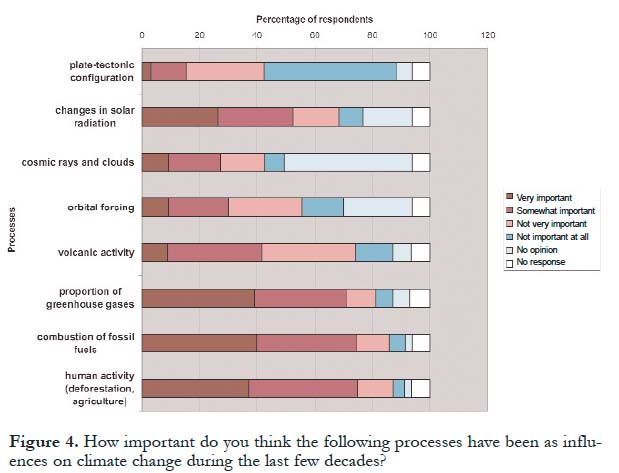
Display large image of Figure 4
24 It is, perhaps, more interesting to note that when asked to agree or disagree with the following statement, Regardless of the science, it is important toaddress greenhouse gases based on a ‘precautionary’ principle that they might be affecting climate change, 29% of our respondents strongly agreed and an additional 43% somewhat agreed [72% in total] (Table 6).
Sources of information on global climate change
25 Respondents were asked to rate the degree of influence various information sources had in convincing them that global climate is currently warming. Scientific journal articles [91%] and conversations with other scientists [90%] were most likely to be rated as very influential or somewhat influential by those respondents expressing an opinion. Respondents also rated, in decreasing order of influence, the following sources of information on climate change: conference presentations [75%]; learned society statements (e.g. Royal Society of London, American Geophysical Union, AAPG) on climate change [72%]; IPCC reports [58%]; media discussions of climate change [47%]; CSPG/GAC position statements on climate change [44%]; websites on climate change [34%]; Al Gore’s movie, An Inconvenient Truth [31%]; conversations with family/friends/neighbours [31%]; considered least influential were environmental groups’ statements (e.g. Sierra Club, Greenpeace, Suzuki Foundation) on climate change [25%].
SCIENCE AND ADVOCACY
26 According to Pawluch (1996, p. 136), professions "organize, consolidate, and then often transform as they face threats to their existence and look for ways to rejuvenate themselves" (cf. Bucher 1962, 1988; Bucher and Strauss 1961). Threatened occupations can also respond to external threats and advance themselves by finding new areas of need; or "entering the social problems arena and linking themselves to pressing social issues" (Shaffir and Pawluch 2003, p. 901-903). As part of an effort to determine whether earth scientists support advocacy as it relates to social problems linked to their scientific expertise, a number of questions were posed that addressed how climate change is presented and understood within the larger community. The results clearly indicate that our survey respondents were not satisfied with how climate change science is provided by the IPCC (Table 7). Only 16% strongly agreed that it provided the best scientific information available on recent climate change. Only 1% of those expressing an opinion strongly agreed that the media do a good job whereas 53% strongly disagreed. Similarly, 54% strongly disagreed that environmental groups could be trusted to present complex arguments about climate change to the general public. A further 63% of our respondents expressing an opinion strongly disagreed that most people’s views about recent climate change are informed by scientific knowledge. Not surprisingly, 81% [98% in overall agreement] strongly agreed that politicians are more influenced by public pressure than scientific facts when it comes to climate change issues.
Table 7. Who owns the social problem?
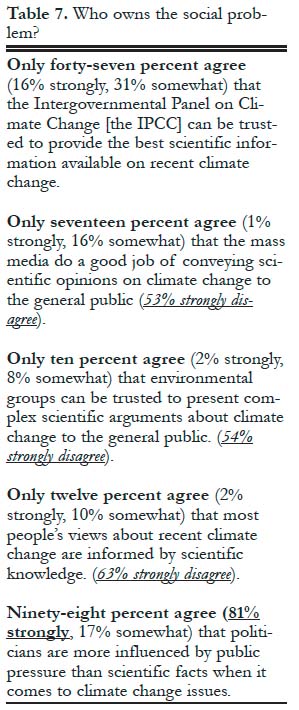
Display large image of Table 7
Table 8. Role of advocacy in science.
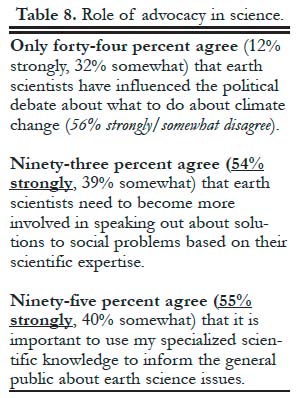
Display large image of Table 8
Who owns the social problem?
27 Given this sense of disillusion and dissatisfaction, it would seem that there is work to be done by the earth science community. The data presented in Table 8 show that a majority of the earth scientists in our survey [56%] felt that the geoscience community has not influenced the climate-change debate, and a strong majority [93%] was of the opinion that earth scientists need to become more involved in advocacy activity, especially given the specialized knowledge that the community can rightly claim regarding earth science issues in general.
28 However, Table 9 clearly indicates that this work is not being done. Only a small minority of the earth scientists responding to the survey have engaged in any kind of outreach activity. It is reasonable to conclude that the individual earth scientists completing this survey are concerned about the issues under review and are already attempting to engage, at some level, in solving them. A majority of these respondents also have post-graduate degrees in the earth sciences, suggesting a high level of expertise in their areas of scientific and professional interest.
29 Despite these attributes, only 27% have given lectures in schools (the most popular type of outreach), and only 21% have presented a public lecture in their area of expertise. Even fewer have engaged in media interviews or written articles or letters to editors, yet the majority have expressed concern about media bias and the media’s inability to present complex scientific arguments to the general public. Service on advisory boards, and perhaps most importantly, the submission of expert briefs to parliamentary and other committees, were also reported by less than 15% of our respondents. Further, in our interviews with opinion leaders in earth science across Canada, it became clear that very few had engaged in extensive advocacy based on their scientific expertise. Clearly, earth scientists appear not to have not taken ownership of social problems about which they feel they have expertise and specialized knowledge.
Table 9. Survey respondents' community outreach.
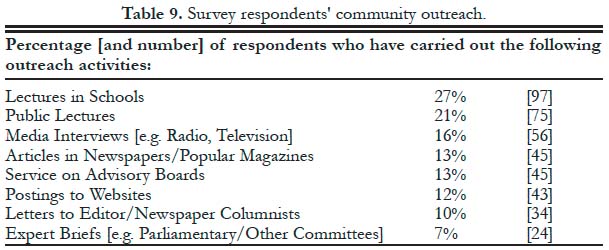
Display large image of Table 9
30 In looking at professional transformation, however, it is important to remember that professions do not speak with one voice nor do they necessarily share a common purpose. Rather, "professions are more accurately described as loose groupings of workers representing a plurality of interests and a diversity of views" (Pawluch 1996, p. 138). Interestingly, the segments that make up a profession and the relationship of these segments to each other can facilitate or impede transformation (Bucher and Strauss 1961; Pawluch 1996).
31 In this regard, despite claims that there is a monolithic negative response on the part of corporations and their allies to warnings concerning global warming, it does not appear to be the case for earth scientists working within the fossil-fuel industry in Canada. In fact, in our survey, the majority of earth scientists working in academic/government institutions and in industry expressed the same general agreement or disagreement with the issues under review. Differences emerging between them, for the most part, were reflected in the degree to which they strongly or somewhat agreed or disagreed with an issue. Although we do not claim that we can generalize these survey results to the entire community of earth scientists working in Canada, the results do reflect the perspectives voiced by our interview subjects, whether in universities, government or industry.
What should be done?
32 Earth scientists have had difficulty making the case for their science. When we began this research in 2005, the community was still trying to digest and understand the third funding cut in a row handed down by the NSERC "Reallocation Exercise." Many reasons for these cuts were suggested to us in our interviews. One of the more common opinions was that the science appears too "diffuse". Interdisciplinarity may be both its greatest strength, in terms of the techniques for problem solving, and its greatest weakness in terms of public understanding. Perhaps fortuitously, NSERC has since decided that Reallocation will not be attempted again.
33 In terms of institutional organization, the Canadian Geoscience Council was an organization that attempted to pull together the nation’s many and varied earth science associations, but became inactive some years ago. A new body, the Canadian Federation of Earth Scientists [www.geoscience.ca], is now attempting to renew this national effort. It is carrying out a national employment survey to be released in July 2008, and is co-sponsoring the Gussow/Nuna conference on "The Geoscience of Climate Change", to be held in Banff in October 2008 [www.cspg.org/conventions/Gussow2008/index.cfm].
34 The Federation supports the work of the International Year of Planet Earth [http://yearofplanetearth.org] and the holding of national geoscience conventions. The last of these was GeoCanada 2000, in Calgary; the next is being planned for 2010 in Calgary. Perhaps such conventions should become the norm, rather than rare events, and held in other locations as a means to draw the earth science community together on a more regular basis.
35 If the earth science community is concerned that its views regarding energy and environmental issues are not being heard, it is because the earth sciences do not "own the social problems." The petroleum industry, led primarily by business management, currently appears to define the position of the industry on issues surrounding fossil fuel energy and the environment, and conveys these views to media, politicians, and the general public. Economists and lawyers, rather than earth scientists, discuss petroleum reserves and the future of energy supplies. These positions may not reflect those of the geoscientists who find and exploit fossil-fuel resources or work as environmental geoscientists. In that regard, climate science appears to be "owned" by oceanographers, atmospheric physicists and meteorologists, not those earth scientists who work with the rock record and whose contributions to the study of our highly variable postglacial climate have been substantial.
36 The challenge to earth scientists, it would appear, is to come together as professional segments to take ownership of their scientific knowledge and their scientific expertise, to make the case for the relevance of this knowledge to current social problems, whatever they may be, and, in the process, to re-establish themselves, their discipline and their profession as essential in an ever-changing and complex world.
An agenda for change
37 The work of the International Year of Planet Earth is a good beginning. Its focus on public education about the earth sciences, primarily in the schools at all levels, is essential, given the general lack of earth science courses in many parts of Canada. The CBC production, The Geologic Journey, has also contributed to general knowledge in the area. However, there also needs to be a concerted, on-going effort to educate children, the general public and social policy makers about the essential roles of earth scientists in resource exploration/extraction and environmental protection and remediation. The problems of depleting reserves, rising oil and gas prices, and environmental pollution are issues that the profession is centrally placed to help resolve. Who knows best not only where the remaining oil and gas are to be found, but where to store the CO2 that results from their use? Who knows the most about groundwater resources and the consequences of aquifer pollution? Who knows the most about nuclear fuel resources and where to safely store nuclear waste? Earth scientists have the most comprehensive scientific expertise and skill sets to understand the nature and extent of earth’s natural fossil resources, the unintended consequences of their use, and best practices for the disposal of the resulting waste products. The following recommendations might be considered.
- Develop public position statements that tie earth science skills to fossil-fuel resource assessment and extraction, and the continuing importance of these resources to society.
- Develop parallel and complementary public position statements concerning the role of earth sciences in environmental protection and remediation.
- Develop public position statements concerning the important contribution that the solid-earth geosciences should be making to the understanding of climate change. For example, emphasis could be placed on understanding the non-uniformitarian nature of anthropogenic climate-change processes by situating them within a scientific paradigm based on the principle of uniformitarianism.
- Work to provide a better focus at universities for the provision of programs in environmental science through earth science departments. In many cases, such teaching is diffused through many mainline science, social science and humanities programs.
- Develop a professional television and print-media advertising/promotion campaign that links earth sciences to the three complementary themes of resource extraction, environmental protection, and the understanding of climate change.
- Work to re-establish the essential role of federal and provincial earth science surveys in these three related areas through baseline research and national monitoring and mapping programs.
- Promote at a national level the work of professional geoscience registration in providing a highly trained, responsible and ethical workforce that is even now focusing on the issues described here.
- Highlight through television advertisements, perhaps analogous to the Canadian heritage series, the contributions that Canadian earth scientists have made to the understanding of earth processes, from Sir William Logan to Tuzo Wilson; the rocks and minerals that make Canada great such as Sudbury nickel, Timmins gold, Turner Valley gas, and Leduc oil; and the skills and techniques used around the world such as geophysical methods for mining, the seismic skills headquartered in Calgary, and the contributions of Lithoprobe.
ACKNOWLEDGEMENTS
We would like to acknowledge the cooperation of the GAC and CSPG for their support of our application for funding to SSHRC, and for facilitating the advertising and administration of the survey. We would like to thank present and former members of the GAC Executive, in particular Sandra Barr, David Piper, and Lyn Anglin; and present and former members of the CSPG Executive, in particular Craig Lamb, Jim Reimer, Colin Yeo, and Lisa Griffith. We are also very grateful to John Bell (McMaster University) for programming and administering the online survey, and to Lorna Samraj at All-Languages who assisted us in the translation of the survey into French. CSPG Office Manager Tim Howard and GAC Office Manager Karen Johnston ensured that the survey was promoted each month in the two society e-newsletters, and provided assistance to us in other ways too numerous to mention. Thanks also to those others in their respective offices who provided technical assistance to the project. Finally, we would like to thank the many earth scientists who agreed to be interviewed and took the time to fill in the survey.REFERENCES
Beder, S., 2002, The Corporate Assault on Environmentalism, Revised Edition: Chelsea Green Publishing, White River Junction, Vermont, 288 p.
Bucher, R., 1962, Pathology: A study of social movements in a profession: Social Problems, v. 10, p. 40-51.
Bucher, R., 1988, On the natural history of health care occupations: Work and Occupations, v. 15, p. 131-147.
Bucher, R., and Strauss, A., 1961, Professions in process: American Journal of Sociology, v. 66, p. 325-334.
Natural Science and Engineering Research Council, 2000, Survey of Earth Sciences Research in Canada: [http://www.nserc.gc.ca/programs/real2000/web-earth-e.htm].
IPCC (Intergovernmental Panel on Climate Change), 2007, Climate Change 2007: The Physical Science Basis: Cambridge University Press, 1009 p.
McCright, A., and Dunlap, R., 2000, Challenging global warming as a social problem: An analysis of the conservative movement’s counter-claims: Social Problems, v. 47, p. 499-522.
Pawluch, D., 1996, The New Pediatrics: A Profession in Transition: Aldine de Gruyter, New York, 175 p.
Shaffir, W., and Pawluch, D., 2003, Occupations and professions in Reynolds, L. and Herman-Kinney, N., eds., Handbook of Symbolic Interactionism: Altamira Press, Toronto, p.893-
Skodvin, T., and Skjærseth, J., 2001, Shell Houston, we have a climate problem!: Global Environmental Change, v. 11, p. 103-106.
